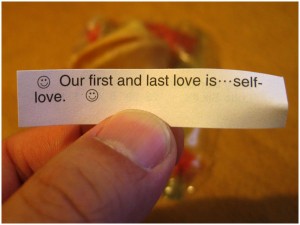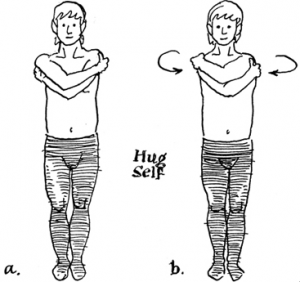 I’m communicating with you. Or at least I’m trying to.
I’m communicating with you. Or at least I’m trying to.
It’s an easy process, especially within the context of a blog post. Me to you. One to many. Unidirectional. No feedback (save for any comments.)
Communicating with others, true communication, can be a challenging thing. It requires active listening, compassion, grace and all manners of other techniques to assure that we understand the message the other person is sending, and carefully sharing our own perspective in such a way to enable others to understand you.
Communication with self is essential. Of all the communication that we have throughout a day, expressing ourselves to our self is most critical. Do we understand ourselves? Do we seek to understand?
The only way we can share something is if we have it. I cannot give you any flour or eggs for your recipe if I don’t have any to give. The same is true for our emotions. Love, support, encouragement, passion. If we want to be compassionate with others, we must be compassionate with ourselves. If we want to be authentic with others, we need to be authentic with ourselves first.
 What a challenging realization. Many times we operate from paradigms that were constructed in a time period of life that we do not fully recall. My dad died when I was 8. In my early childhood, I didn’t have anything resembling a father figure. These and other experiences affect our development in ways we cannot always tell. They paint our world in a way that we simply interact with, and if we never dig deeper into the why, it leaves us lacking to be able to provide answers to ourselves and others.
What a challenging realization. Many times we operate from paradigms that were constructed in a time period of life that we do not fully recall. My dad died when I was 8. In my early childhood, I didn’t have anything resembling a father figure. These and other experiences affect our development in ways we cannot always tell. They paint our world in a way that we simply interact with, and if we never dig deeper into the why, it leaves us lacking to be able to provide answers to ourselves and others.
Why all this “deep” talk?
Last night Heather and I came to joint realizations.
Forgive me for attempting to be appropriately vague. It wasn’t comfortable (for for either of us), but it was significant. Here’s the situation: likely from day one of our relationship — and certainly well over a year — I have a habit that Heather doesn’t appreciate. I thought nothing of it and was even defensive, going so far as to explain it as something that can be of benefit to her**. Last night Heather realized why she doesn’t like it and it helped me to understand why I might tend to do it without thinking!
Growing up without a Father was challenging. My mother did everything in her power to provide and give me a great life (and she did), but there were still some things that she could not provide. One of these things is validation of my “Manhood”. I’m trying to reduce the sexual element of the word, and suffice it to say, I hope you’re on the same track. I believe that in a Man’s life, he must come to the self-realization that he is Worthy; capable of being a hero and warrior, to live a life of adventure and risk. I believe that without another man to help bestow this gut-based knowledge at a young age, it requires a much longer and winding road to accomplish the same. I spent many years trying to find my own validation in relationships that were in no way healthy, although they may have been a lot of quasi-empty fun.
So the bottom line is that we came to the conclusion that some of our actions had been driven by the perception that we were not whole and worthy. Back to what I said earlier: a significant realization.
Today, Heather received an email from Joyce Meyer Ministries that touched on the exact topic of concern. As Heather put it, “Apropos after our conversation last night, eh?”
Take a read for yourself:
How Do You See Yourself?
by Joyce MeyerDo you like yourself? After years of trying to help people emotionally, mentally, spiritually and socially, it was a major breakthrough when I discovered that most people really don’t like themselves. Some of them know it, while others don’t even have a clue that this is probably the root of so many other problems in their lives.
God wants us to have great relationships, but self-rejection and even self-hatred are the roots of many relationship problems. In fact, I’ve found the Bible to be a book about relationships, providing valuable advice about my relationship with God, other people and even myself.
How are the relationships with other people in your life? What about your relationship with God…and even with yourself?
Did it ever occur to you that you have a relationship with yourself? While I’ve never given it much thought, I spend more time with myself than with anyone, and it’s vital to get along well with me. Remember, you are the one person you never get away from.
We all know how agonizing it is to work day after day with someone we don’t get along with, but at least that person doesn’t come home with us at night. We can’t get away from ourselves, not even for one second, so it’s of the utmost importance that we have peace with ourselves.
Many of us fall prey to self-rejection because we feel that nobody really loves us or accepts us. We figure that if nobody else loves us, then why should we love ourselves? Because we think others don’t love us, we feel that we must not be worth loving. But that’s a LIE we’ve believed for way too long!
We should love ourselves—not in a selfish, self-centered way that produces a lifestyle of self-indulgence, but in a balanced, godly way that affirms God’s creation as essentially good and right. We may be flawed by unfortunate experiences we’ve gone through, but that doesn’t mean we’re worthless and good-for-nothing.
We must have the kind of love for ourselves that says, “I know God loves me, so I can love what God chooses to love. I don’t love everything I do, but I accept myself because God accepts me.” We must develop the kind of mature love that says, “I know I need to change, and I want to change. In fact, I believe God is changing me daily, but during this process, I will not reject what God accepts. I’ll accept myself as I am right now, knowing that I will not always remain this way.”
Many times people who reject themselves do so because they can’t see themselves as good, proper, or right. They fail to see themselves the way God sees them—as precious children He dearly loves.
As you begin to see yourself through God’s eyes—someone who’s loved and cherished—your view of yourself will begin to change. You’ll begin to see yourself not as rejected, but as loved and accepted…unique and beautiful in His sight.
Apropos indeed.
Thanks for reading along, I hope it added some value to your day.
Best,
-Cody
FOOTNOTES:
**This is a quintessential example of my ability to rationalize and justify. I don’t condone it, not in myself, not in others. I believe that my role as a husband is to submit my own desires for the good of the relationship. It should have been enough for Heather to express that she didn’t like it. That’s all it ought to have taken. Shame on me for my selfishness.


